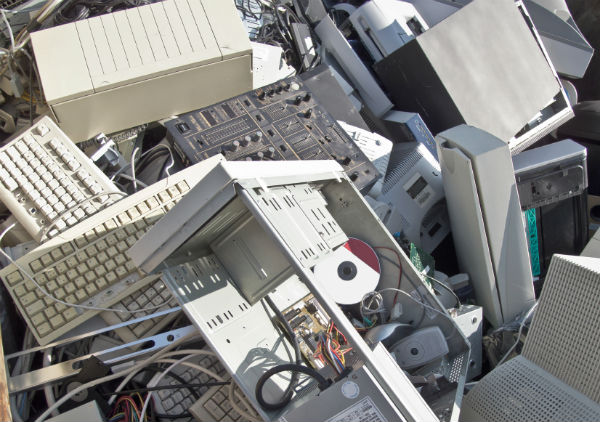When it comes to unwanted possessions, our culture prefers to “drop ‘em like they’re hot”
so we can upgrade to the latest freshly minted factory line creations. Rarely do we ever contemplate where our junk ends up, but chances are pretty good that the really toxic e-junk that we regard as yesterday’s news ends up on a slow boat all the way to Third World regions such as
Agbogbloshie dump in Ghana.
They say that a picture is worth a thousand words, but you might actually be rendered speechless if you choose to peruse the indelible images of burning African e-waste courtesy of
South African photographer Pieter Hugo or
award-winning Irish photojournalist Andrew McConnell. In both cases, we’re forced to acknowledge the glaring reality of the e-waste we’ve pawned off on the other side of the world — an unfathomable eyesore that is the direct result of our endless pattern of consumption and disposal.
It really doesn’t seem fair or even ethical, but for years we’ve literally dumped our burgeoning e-waste problem on the world’s back yards, all for a few key reasons. The majority of the globe’s highly industrialized areas have stringent laws that expressly forbid toxic garbage from being deposited into domestic landfills, whereas developing countries typically lack environmental regulations of any kind, making it mighty appealing to adopt an “out of sight, out of mind” stance.
It is also a lot more cost effective to send this type of waste abroad (roughly
$5,000 U.S. to send one 40-foot cargo container), making the ever-perplexing necessity of hammering out a domestic recycling plan far less urgent.
It isn’t quite as simple as good versus evil, though. Residents of America, Europe and on occasion even Asia think that they’re doing right by the environment when they purposefully seek out seemingly on-the-level e-waste recycling programs to donate last year’s computer, television or gadget.
They walk away with a clear conscience,
but behind the scenes, the collected materials are inevitably purchased in bulk by e-waste dealers who ultimately export them via hundreds of cargo containers to their final dumping zones in
China, India, the Far East and Africa, often intentionally mislabeling them as secondhand goods. This simple deception has kept the flow of Third World-bound electronic junk fast and furious.
At its final landfill destinations, battered and worn-out electronic waste is then typically hand sorted by children who are paid a minor sum to retrieve whatever valuable metals they can find — an appealing “opportunity” in regions plagued with continued poverty.
They habitually burn plastic computer cases and other electronic junk in
polyaromatic hydrocarbon and dioxin-laden fires (
filled with cadmium, lead and mercury fumes) in order to better access the copper wires, circuit boards, gold, nickel, iron, silicon and other potential income-producing materials within. Sadly, behind-the-scenes investigators have learned that at least some of the reclaimed e-waste metal that children harvest
is typically recycled into bullets.
As you can imagine, throughout the process of all their hard work, these unfortunate junior workers are exposed to multiple cancer-causing agents that reportedly create a black haze that billows above the Agbogbloshie dump. It’s not surprising that such toxic particulates trigger immediate respiratory problems, but doctors suggest that there are also other
long-term health concerns to be on the lookout for, such as brain, nervous system and reproductive development issues. So, as you can see, this is a tremendous injustice on so many levels.
For quite a few years now, various international environmental agencies have documented the surprisingly seedy underbelly of the recycling/e-waste industry and many concerned citizens probably assumed that officials had somehow rectified the situation by now. Unfortunately, the U.K.’s Environmental Agency just wrapped up a three-year investigation confirming that approximately 30 criminal gangs have diligently kept the e-waste market alive and well, illegally exporting vast amounts of broken televisions, computers and other e-devices (hailing from various locations throughout Great Britain)
directly to dump sites in Ghana and Nigeria.
The good news is that multiple e-waste kingpins are in the process of being prosecuted, but it’s surprising to note that the
harshest consequences they face include serving up to two years in jail or financial penalties.
When you consider the allure of making several thousand dollars per e-waste container — with an average of just
3% of them actually examined by European port customs officials — it would seem that those interested in easy money might perceive the benefit of this trade as more than outweighing the risk.
Perhaps a fitting punishment for those who sling toxic electronic junk for a living should really be to charge them with the task of cleaning up a specific region with their own two hands… or becoming the caretaker of a child that falls ill from e-waste work-related responsibilities.


